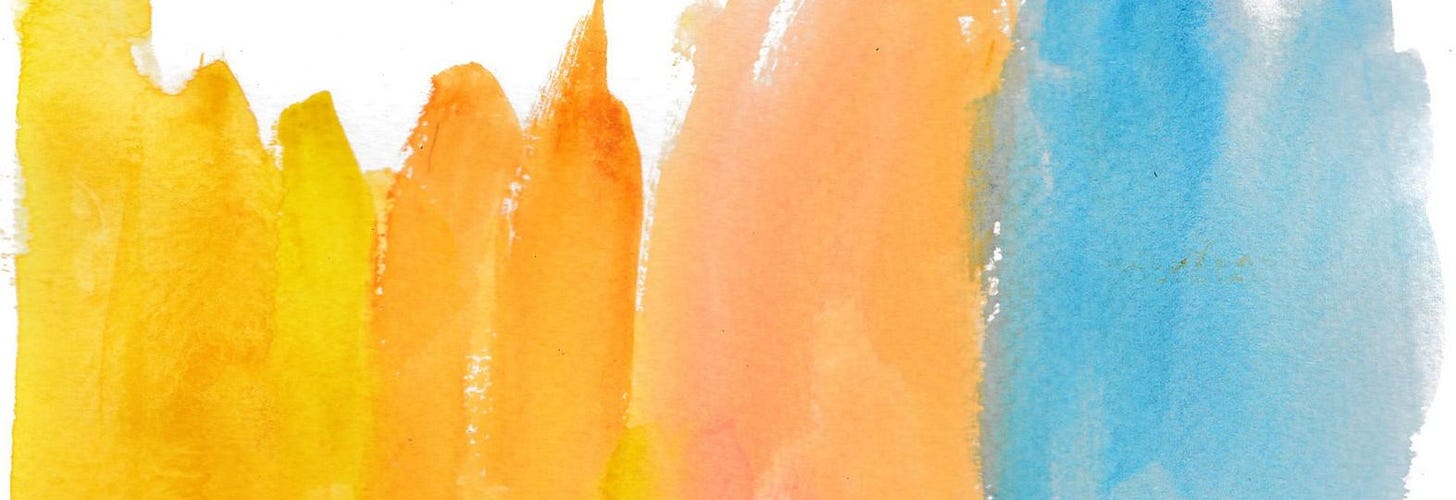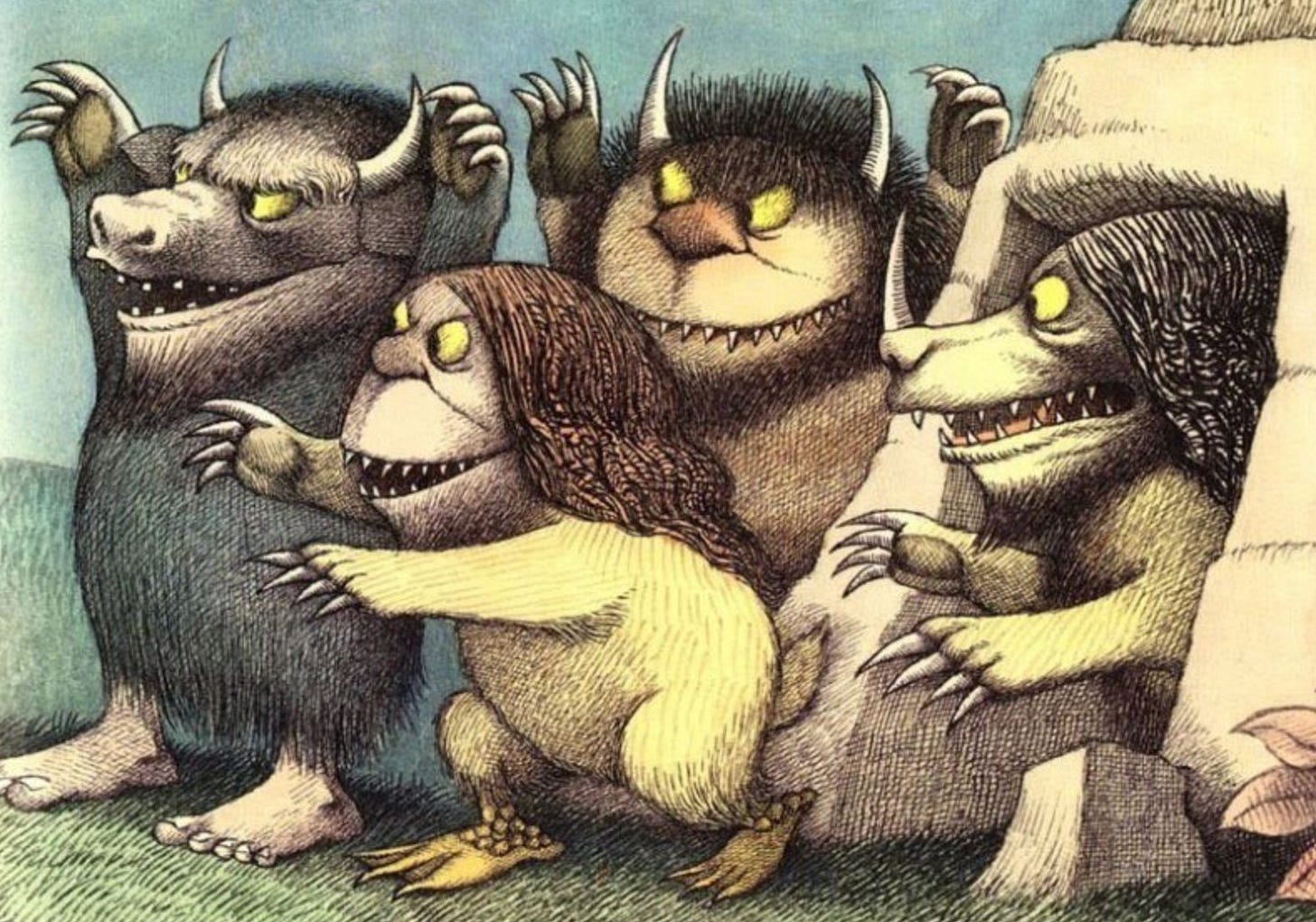I call it the Beast that lives in my head.
For much of the time, the Beast lives in a cage, banished to the back of my mind. I’m always aware of its presence, continuously hearing its growls at various volumes and watching it pace back and forth in anticipation of release.
There are days when the growls are quieter, and the lock on the cage seems stronger.
But all too quickly, even a short period of stress can erode the cage bars, and the Beast is always prepped to jump out and charge. It reminds me of Where The Wild Things Are, the monsters who "roared their terrible roars and gnashed their terrible teeth and rolled their terrible eyes and showed their terrible claws.”
I've struggled with symptoms of OCD for most of my life, but it really ramps up when I'm stressed. Recently, I've been anxious about a transition that I have no control over, and those cage bars are barely hanging on for dear life. The Beast is in constant danger of unleashing. A very simple trigger will become the key that unlocks its cage.
When the Beast breaks through, my body reacts as though there is actually a giant monster in front of me. I panic. I am flooded with the cruelest thoughts, the saddest memories, the meanest feelings. I feel utterly defenseless against this force, who looked sort of cute and dopey in his cage but is now taking over my whole mind, and therefore body, and therefore spirit.
To lessen its power, I imagine it purple and fuzzy and goofy, with three eyes and horns. I try to cry it out. None of this helps much.
Recently, I had three of these "episodes" in one week, which is increasingly rare. I've been working really hard in therapy to manage these thoughts, and I can usually pull myself mostly out of them (with a lot of effort). In the case of these episodes, it was impossible.
"Think about something else."
"Focus on the positive."
"Just remember that you're loved."
They're lovely ideas, but when you feel like a monster is standing in front of you with its teeth flashing and its claws showing, it feels about as useful as hearing "You know, I really think The Pain of Loving You is the most underrated Dolly Parton song."
In those moments, I'm under attack.
OCD will prey on the things that we cherish most, and put a barrier between us and them: For some people that can present as never being clean enough, a common stereotype of this strange affliction. I don't have that obsession with order and cleanliness (obvious to anyone who knows me) but I have intrusive thoughts that feed on my worst fears about the most important parts of my life.
After those terrifying mental spirals, I look back on the spiral and think, "What was that?" but in the moment the thoughts are so real, so urgent.
A while back I wrote this piece about my relationship with control, and I must confess, I really thought I was...done. I went to therapy, I went on medication....What more did my brain need from me?!
I neglected to realize that taking care of my brain is a lifelong commitment, not a Limited Time Only run.
As is the case with the purely physical, my mind will feel stronger and weaker at various points, just as I can sometimes get through my barre class without trying to sneak in a quick nap and other days it feels like the first time I've ever exercised in my life.
I'm a person who loves finishing things: a book, a list, an era. I crave completion, an "I did it!" sticker. But this OCD/anxiety/depression stuff, unfortunately, is not coming to an end anytime soon: I'm stuck with this brain for life. As my mom lovingly said, "It's hard to be Mari, and it always will be."
There's liberation in this. It means that I don't have to suffer the consequences of beating myself up because I'm not healed in addition to suffering the consequences of wonky chemistry. It means that no accomplishment or external validation is going to transform me into a carefree person. It means that I'm committed to therapy and medication, probably forever, and I'll have to prioritize those like I prioritize tooth-brushing and moisturizing. And it means that I'll have good days, better days, hard and harder days.
There's no finish line; there's just learning to live with and even embrace the glitches that make my mind a wild place to spend my time.
The journey has transformed from a paved road into a rocky mountain. It can't be driven through; it must be respected, experienced, and navigated. Here are some ways that I'm exploring this terrain:
Get physical: It takes us years to learn the simplest ways to take care of our minds: move, sleep, eat well. I now do all three with only one goal: to feel really good. This has changed the way I exercise; I work out to give my brain a spa day. I'm disciplined because I know it will help with anxiety (this takes pressure off the triathlon daydream). I give myself permission to gravitate toward a teacher based on energy and voice and I'm picky about lighting and vibe; if I'm not feeling full-body-mind good in a certain setting, then it's not for me!
Likewise, I eat to feel fully alive and jazzed about the world around me. Eating is my time to enjoy nature's gifts and delight in my favorite sense: taste!! There's lots of research about nutrition for mental health, but I'm so much less dazzled by "proof" than I am my own feeling. I've heard that green juice doesn't have much nutritional benefit but GUESS WHAT, it feels great to me, so...therefore it has benefit.
Depend on others: I live in a hyper-individualistic society that supports a narrative that we have to heal ourselves before entering into relationship and community, but in fact we heal with others. Holiness has always dwelled in coffee shops and skateboarding clubs and temples and AA meetings where humans can arrive broken and be welcomed in their brokenness. I lean on people in my own communities and let myself be unfinished and unfolding in their presence.
Tend to the mind's contents: I am extravagantly intentional l about what gets put in my mind. I don't have any social media on my phone, and I consume the news slowly and carefully (mostly in print). More importantly, I don't put a higher value on current events than what's actually going on in my life and with the people in my life (Oliver Burkeman wrote a stunning essay that inspired this personal policy).
Ritualize joy: My coach challenged me to make my rituals "bizarrely small" in an effort to keep me from feeling like I need to follow a strict routine. So, the only ritual I practice every single day without fail is listening to a song first thing when I get up and say a one-sentence prayer and spend a moment appreciating the view out of my window and the presence of my cat. If I don't do this, I see a negative domino effect on the rest of the day. Beginning my morning with a small vote for what matters most to me (connecting with the Divine, with myself, and with love) sets the standard for the day.
Make stuff: There are times when I feel up for the task of being out in the world when I'm struggling mentally, and there are times when I need to moonwalk out of a social setting and ride the wave alone. In that case, I make stuff: art, food, anything creative that lets me expand my mind out of my body and on to a piece of paper or a plate, far away from the roaring Beast.
I've been writing this newsletter for almost a year now, and getting to come here and "make stuff" for you once a week has been the foundational joy of my life. Thank you so much for being here and showing up and allowing me to mix metaphors; it means so much to me.





